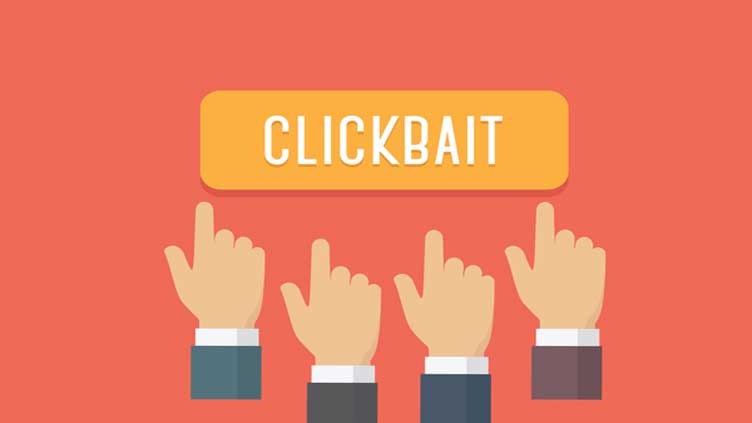Clickbait - pitfalls outweigh promises

Technology
Clickbait - pitfalls outweigh promises (Image: Cariad Marketing)
By Humaira Afzal
In the era of social media, where information is readily available at our fingertips, this abundance of information can sometimes makes it difficult to distinguish between what is truly valuable and what is useless. We frequently encounter attention-grabbing headlines that are deliberately sensationalised. These clickbait headlines lure us with promises of extraordinary secrets, shocking revelations or miraculous solutions, only to direct us to content that is irrelevant or inadequately researched.
By employing various attention-grabbing techniques such as exaggeration, sensationalism, curiosity gaps or emotional triggers these are carefully crafted to pique the interest of users and entice them to click on the associated link.
The content behind clickbait headlines often fails to deliver on the promises made in the titles. It may be shallow, poorly researched, lack substance, or offer little practical value. Clickbait headlines are often associated with advertising-driven revenue models. These tactics are employed to maximise the number of clicks, leading to more ad impressions and potential conversions to generate revenue through advertisements, sponsored content, or affiliate marketing.
The algorithms employed by social media prioritise engagement metrics, such as clicks, likes and shares to determine the visibility and reach of a post. However, when a user clicks on sensationalised headlines and finds shallow or irrelevant content, it leads to disappointment, frustration and erosion of trust. Repeated encounters with such headlines erode users' confidence in the source or platform, questioning its reliability and credibility. This perception of misleading practices damages the platform's reputation and leads to a decline in user engagement.
Users may gradually lose interest and seek out more trustworthy sources, impacting the platform's metrics and potentially causing it to lose its audience.
It is crucial to recognise the detrimental effects of clickbait headlines on the user experience and the quality of information available online. Promoting more informative, accurate and meaningful content is essential for building user trust, fostering engagement and contributing to a healthier digital ecosystem.
.jpg)
(ESIC Business and Marketing School)
Another detrimental effect of clickbait that needs to be addressed promptly by law-enforcement agencies is its role as a breeding ground for the spread of misinformation. Clickbait headlines often prioritise attracting attention and generating clicks over providing accurate and reliable information. Misinformation can rapidly propagate through social media platforms and other online channels, resulting in significant harm by shaping public opinion, influencing decision-making and even posing risks to public health, fuelling panic, or undermining trust in reliable sources.
Social media platforms are intelligently designed to keep us engaged and scrolling for as long as possible. However, this endless scrolling often leads to mindless consumption of random content without purpose. Mindless scrolling consumes a significant amount of time and attention, diverting individuals from more productive tasks or activities. It can lead to procrastination, decreased focus, and a lack of accomplishment, ultimately hindering personal and professional growth.
Studies have linked excessive social media use to increased feelings of loneliness, envy, anxiety, depression and low self-esteem. Constant exposure to carefully crafted highlight reels of others' lives can create unrealistic comparisons and dissatisfaction with one's own life.
Mindless scrolling often involves consuming vast amounts of information in a short span of time. However, this rapid exposure to snippets of content can lead to shallow knowledge and a lack of critical thinking. It becomes challenging to retain meaningful information or engage in deep learning when constantly skimming through a vast array of unrelated content.
Scrolling through social media before bedtime has been shown to disrupt sleep patterns and quality. The blue light emitted by screens can interfere with the natural sleep-wake cycle, leading to difficulties falling asleep and experiencing restful sleep. Poor sleep can further exacerbate mental health issues and negatively impact overall well-being.
It's important for individuals to be mindful of their social media usage, set boundaries and prioritise activities that promote personal well-being, genuine connections, and personal development.
While social media can undoubtedly offer valuable information, connections, and opportunities, it is essential to be mindful of the content we engage with. Clickbait headlines with shallow content have damaging consequences. Users feel deceived and disillusioned when they click on such headlines and find irrelevant or shallow content, eroding their trust and leaving them feeling misled.
Consistent encounters with clickbait raise doubts about the credibility and reliability of the source or platform, undermining its trustworthiness, associate it with low-quality, leading to negative word-of-mouth.
Engagement and user interaction decline as users become wary of clickbait, actively avoiding or ignoring headlines. The LEAs should take strict/prompt action against willful spread of false information and rumour to disrupt public peace. By discerning between valuable and useless information, we can ensure that our digital experiences contribute positively to our lives in this modern era.

